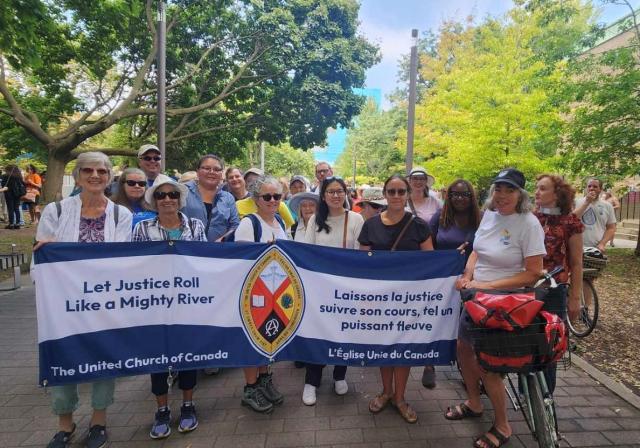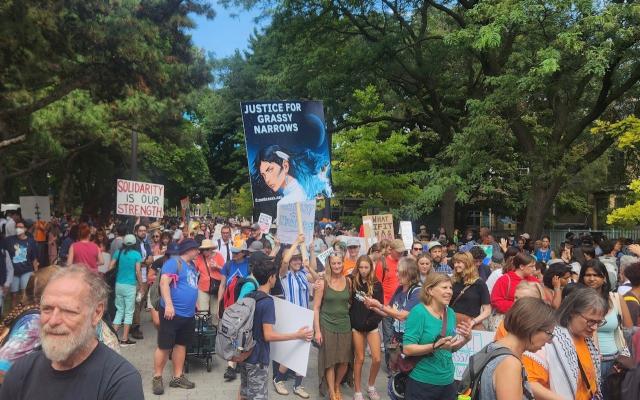Join The United Church of Canada in lifting Grassy Narrows’ call for mercury justice and healing, spotlighting the fight for health, equity, and sustainability.

For International Development Week 2025 (February 2–8) The United Church of Canada highlights global partners who are contributing to the Sustainable Development Goals.
In this Centennial year of The United Church of Canada, we pause to reflect on a shared history—one of faith, solidarity, and the deep scars of colonial harm. As we celebrate International Development Week 2025, we stand with Grassy Narrows First Nation, lifting their call for mercury justice and the healing of their land, waters, and community.
A March for Justice and Healing
On September 18, 2024, over 50 United Church ministers, members, and staff joined 8,000 allies at the Grassy Narrows River Run in Toronto. Encouraged to join by Healing Program Coordinator Joni Shawana, the United Church contingent marched alongside Grassy Narrows youth, Elders, and leaders, amplifying their call for action to address the ongoing impacts of mercury poisoning on their community, lands, and waters.
The march, organized by Free Grassy, began at Grange Park and wove through downtown Toronto, pausing for moments of healing drumming, dancing, and solidarity. At Queen’s Park, Grassy Narrows leaders shared deeply moving stories of resilience and the urgent need for justice.
- Chief Rudy Turtle spoke of government inaction and broken promises.
- Elder Robert shared his experience of living with mercury poisoning and his unwavering commitment to protect the land and water for future generations of Anishinaabe people.
- Chrissy Isaacs, a grandmother, reflected on her lifelong advocacy for mercury justice and the intergenerational toll of environmental devastation on her community.
Their words were a profound reminder that the fight for mercury justice is not just for today—it is a fight for the health and dignity of future generations of Indigenous Peoples.

Sustainable Development Goals in Canada
Long before the UN Sustainable Development Goals were created, Indigenous Peoples, as original stewards of land and water, have led and continue to lead the way to protect and conserve the environment and natural resources. The call for mercury justice at Grassy Narrows resonates deeply with several Sustainable Development Goals (SDGs), highlighting the interconnected nature of justice, health, and environmental stewardship.
- SDG 3: Good Health and Well-being: Mercury poisoning has devastating effects on human health, particularly for Indigenous communities who rely on their lands and waters. Advocating for mercury cleanup directly supports the health and well-being of Grassy Narrows.
- SDG 6: Clean Water and Sanitation: The contamination of rivers and watersheds violates the fundamental right to clean water. Addressing this injustice ensures access to safe and sustainable water resources. In addition, many First Nations communities don’t have access to clean water despite repeated demands for their rights.
- SDG 10: Reduced Inequalities: The fight for mercury justice is a fight against systemic inequalities that disproportionately impact Indigenous Peoples. By continuing to walk alongside Indigenous Peoples in their calls for justice, we work towards a more equitable society.
- SDG 15: Life on Land: Protecting the land and restoring ecosystems affected by mercury contamination aligns with efforts to preserve biodiversity and ensure the sustainability of natural resources.
- SDG 16: Peace, Justice, and Strong Institutions: Advocacy for government accountability and community empowerment strengthens institutions and fosters justice for communities impacted by rights violations and injustices.
A Centennial Reflection and Commitment to Solidarity
As we mark our Centennial, we celebrate a rich legacy of justice and partnership—and we also acknowledge The United Church of Canada’s role in the colonial systems that have caused harm to Indigenous Peoples. Our history includes participation in the residential school system and other systems of colonial oppression which continue to this day.
This legacy challenges us to act with humility and accountability, to listen deeply to Indigenous voices, and to walk in solidarity on the path of healing and justice. The ongoing crisis at Grassy Narrows calls us not only to advocate for mercury justice but also to confront the broader systems of oppression that continue to harm Indigenous Peoples and their lands.
Our Centennial is a moment to recommit ourselves to this work as allies and learners, standing alongside Indigenous communities as they lead the fight for justice and restoration. The United Church of Canada is grateful for the opportunity to support Grassy Narrows in their journey toward healing and for the trust extended to us by Indigenous partners as we seek to do better together.
What Can You Do to Contribute to the Sustainable Development Goals?
- Advocate: write to the provincial and federal governments urging them to clean up the mercury-contaminated waters, compensate the community, and halt harmful industrial practices on Grassy Narrows land. Visit the Free Grassy Narrows website to learn more about this issue.
- Learn more about the work of Indigenous Ministries by following the United Church Indigenous Ministries Facebook page, visiting the Indigenous Ministries webpage, and supporting their advocacy initiatives.
- Learn more about and donate to the Healing Fund to support healing initiatives for survivors of the residential school system and its ongoing intergenerational impacts.
- Give to Mission and Service to help support Canadian and global partners working towards meeting the Sustainable Development Goals.
- Follow United Action for Justice on Facebook, Twitter/X, and Instagram, and United Church news and the Round the Table blog for more information on how your community of faith can learn more, participate, and #GoForTheGoals!
- Support your local community’s initiatives. Many United Church community and social justice ministries offer programs to help children and youth succeed.
- Share Let Us Work Together, a prayer for building relationships to make change.